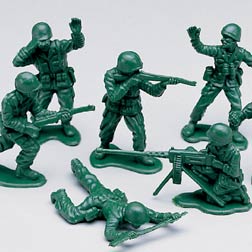… all the good and loyal writers over the borderline in Right Blogsylvania hate the troops of the United States. It is the only logical conclusion, if you believe that the war is a mistake of such gigantic proportion that one day underground monuments will be built as a way of burying the disgrace brought on this nation by those who planned and encouraged this debacle. Yeah, it’ll be like an iceberg, with just the top of it visible aboveground where the individual dead soldiers can be listed, but below will be the largest part, to represent the magnitude of the treachery done to America by its “leaders.” When do we reach the tipping point where support of the Iraq War simply means you wish death upon more and more American soldiers? Or are we there already there?
So, when Michelle Malkin makes her solemn tribute to war dead, saying “Freedom is not free,” she could just as well say, “I don’t care who dies so my verson of imposed ‘liberty’ can be shoved into any place I decide needs it.”
Didja ever notice that people who keep reminding us that “freedom isn’t free” are the same ones who don’t lift a finger themselves to either defend it or take care of it?
Or, as Dr. Atrios put it yesterday, “The willingness to send others off to die for a misguided war because you wet your pants after 9/11 is called ‘cowardice’ not courage.”
Righties just hate it when somebody badmouths the Iraq War. I think this is because they hate interruptions in their fantasy life. For example, Victor Davis Hanson writes about Iraq as if he’s expecting the victory parade any minute now.
…what did 2,400 brave and now deceased Americans really sacrifice for in Iraq, along with thousands more who were wounded? And what were billions in treasure spent on? And what about the hundreds of collective years of service offered by our soldiers? What exactly did intrepid officers in the news like a Gen. Petreus, or Col. McMaster, or Lt. Col Kurilla fight for? …
… The Kurds would remain in perpetual danger. The Shiites would simply be harvested yearly, in quiet, by Saddam’s police state. The Marsh Arabs would by now have been forgotten in their toxic dust-blown desert. …
Yes, Iraqis are so much better off now. Nir Rosen wrote in yesterday’s WaPo …
Under the reign of Saddam Hussein, dissidents called Iraq “the republic of fear” and hoped it would end when Hussein was toppled. But the war, it turns out, has spread the fear democratically. Now the terror is not merely from the regime, or from U.S. troops, but from everybody, everywhere.
Oh, wait … Um, Victor Davis Hanson continues,
… We should remember the achievement this Memorial Day of those in the field who alone crushed the Taliban and Saddam Hussein, stayed on to offer a new alternative other than autocracy and theocracy, and kept a targeted United States safe from attack for over four years.
The reality is that the “crushed” Taliban is making a comeback. Today, thousands of grateful Afghanis rioted in Kabul after an American military truck crashed into a dozen cars on the north side of town, killing and wounding several people. Iraq is being taken over by our buddies in Iran and is well on the way toward becoming an Islamic theocracy. And whether the effort in Iraq did a dadblamed thing to make us safer is purely a matter of faith.
But Hanson’s got his lawn chair parked by the curb, and he’s got his balloons and flags and he knows that victory parade is just around the corner. I’m sure he finds us naysayers tiresome. We’re spoiling the parade.
Today a number of rightie bloggers express concern that Rep. John Murtha’s blabbing about the alleged massacre of civilians by U.S. troops at Haditha will hurt the war effort. IMO this exemplifies the classic colonialist attitude toward the simple swarthy natives, who won’t notice they’re oppressed if we don’t tell them. But the Gulf Times of Qatar says that Iraqis don’t consider a civilian massacre by U.S. troops to be news.
Word that US Marines may have killed two dozen Iraqi civilians in “cold-blooded” revenge after an insurgent attack has shocked Americans but many Iraqis shrug it off as an every day fact of life under occupation.
Despite US military denials, many Iraqis believe killing of men, women and children at the hands of careless or angry American soldiers is common. No reliable statistics are available
I very much hope this is not true, but if a large portion of the Iraqi population believes it is true, then a “rush to judgment” on Rep. Murtha’s part is the least of our problems in Iraq. If we are serious about getting some kind of good outcome in Iraq, such allegations need to be investigated promptly and vigorously, and the U.S. military in Iraq must demonstrate in no uncertain terms that abuse of innocent civilians will not be tolerated. And when allegations are unfounded, then the facts must be made clear and public asap. But pretending everything is just hunky-dory when it’s not is counter-productive to the war effort.
Unless, of course, the “war effort” you are rooting for is a fantasy that lives only in your own head, in which case unpleasant news will get in the way of your glorious imagination.
And then there’s the Dreamweaver in Chief, who enjoys rotating fantasies of being either Ronald Reagan or Harry Truman fighting either the Cold War or World War II. Next he may assume the identity of Frederick the Great in the Seven Years’ War.
The collective fantasies of the Right wouldn’t be such a problem except that they use real soldiers and real wars in their play-acting. Maybe we could get them interested in paintball or Final Conquest. They could enjoy their fantasies and we could get the real soldiers back.

